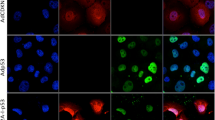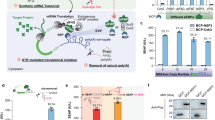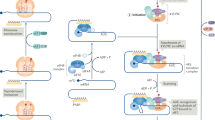Abstract
The translation initiation factor eIF4E is elevated in most solid tumors resulting in translation of mRNAs that are normally repressed by their structured 5′ untranslated region. We have introduced a translational repressor element in a vector (BK-UTK) designed to express herpes thymidine kinase (HTK). This and a control vector (BK-TK) were used to treat experimental tumors of a murine breast cancer line. Both vectors were equally effective in reducing subcutaneous tumors and lung metastases following ganciclovir administration. However, the BK-TK vector was found to be highly toxic, resulting in severe weight loss, degeneration of various organs, and early death of mice following systemic vector delivery, whereas the BK-UTK increased mean survival without toxicity.
This is a preview of subscription content, access via your institution
Access options
Subscribe to this journal
Receive 12 print issues and online access
$259.00 per year
only $21.58 per issue
Buy this article
- Purchase on Springer Link
- Instant access to full article PDF
Prices may be subject to local taxes which are calculated during checkout





Similar content being viewed by others
References
Goldstein LJ, Pastan I, Gottesman MM . Multidrug resistance in human cancer Crit Rev Oncol Hematol 1992 12: 243–253
Goldfarb RH, Brunson KW . Therapeutic agents for treatment of established metastases and inhibitors of metastatic spread: preclinical and clinical progress Curr Opin Oncol 1992 4: 1130–1141
McCormick F . Cancer gene therapy: fringe or cutting edge? Nat Rev/Cancer 2001 1: 130–141
Heppner GH . Problems posed for cancer treatment by tumor cell heterogeneity In: Honn KV, Powers WE, Sloane BF, eds Mechanisms of Cancer Metastasis. Potential Therapeutic Implications Boston, MA: Martinus Nijhoff 1986 69–79
Hall SJ, Mutchnik SE, Yang G et al. Cooperative therapeutic effects of androgen ablation and adenovirus-mediated herpes simplex virus thymidine kinase gene and ganciclovir therapy in experimental prostate cancer Cancer Gene Ther 1999 6: 54–63
Crew JP, Fuggle S, Bicknell R, Cranston DW, De Benedetti A, Harris AL . Eukaryotic initiation factor–4E in superficial and muscle invasive bladder cancer and its correlation with vascular endothelial growth factor expression and tumour progression Br J Cancer 2000 82: 161–166
Kerekatte V, Smiley K, Hu B, Smith A, Gelder F, De Benedetti A . The proto-oncogene/translation initiation factor eIF4E: a survey of its expression in breast carcinomas Int J Cancer 1995 64: 27–31
Turbat-Herrera E, Tucker A, Black D et al. Increase in eIF4E protein and neovascularization in cervical carcinoma Southwestern Association for Clinical Microbiology Meeting, Oklahoma City, Oklahoma 1999 8 Abstract
Rosenwald IB, Chen JJ, Wang S, Savas L, London IM, Pullman J . Upregulation of protei synthesis initiation factor eIF4E is an early event during colon carcinogenesis Oncogene 1999 18: 2507–2517
Nathan CO, Liu L, Li B, Abreo F, Nandy I, De Benedetti A . Detection of the proto-oncogene eIF4E in surgical margins may predict recurrence in head and neck cancer Oncogene 1997 15: 579–584
Williams BJ, Eastam JA, Venable DD, DeBenedetti A, Acree DT . The effect of the translation initiation factor EIF4E on VEGF and angiogenesis in prostate cancer American Association for Cancer Research Special Conference in Cancer Research: Angiogenesis and Cancer, Orlando, Florida 1998 B69–70 Abstract
Clemens MJ, Bommer UA . Translational control: the cancer connection Int J Biochem Cell Biol 1999 31: 1–23
Kevil C, Carter P, Hu B, De Benedetti A . Translational enhancement of FGF-2 by eIF-4 factors, and alternate utilization of CUG and AUG codons for translation initiation Oncogene 1995 11: 2339–2348
Kevil C, De Benedetti A, Payne KD, Coe LL, Laroux S, Alexander S . Translational regulation of vascular permeability factor by eukaryotic initiation factor 4E: implications for tumor angiogenesis Int J Cancer 1996 65: 785–790
Scott PAE, Smith K, Poulsom R, De Benedetti A, Bicknell R, Harris AL . Differential expression of vascular endothelial growth factor mRNA versus protein isoforms expression in human breast cancer and relationship to eIF4E Br J Cancer 1998 77: 2120–2128
Hirt B . Selective extraction of polyoma DNA from infected mouse cell cultures J Mol Biol 1967 26: 365–369
Verma IM, Somia N . Gene therapy — promises, problems, and prospects Nature 1997 389: 239–242
Ghosh K, Muirhead D, Christie B, Hiwase D . Ultrastructural changes in peripheral blood neutrophils in a patient receiving ganciclovir for CMV pneumonitis following allogenic bone marrow transplantation Bone Marrow Transplant 1999 24: 429–431
Ramesh R, Marrogi AJ, Munshi A, Abboud CN, Freeman SM . In vivo analysis of the “bystander effect”: a cytokine cascade Exp Hematol 1996 24: 829–838
Acknowledgements
We extend our thanks to Dr Gloria Caldito for her guidance with the statistical analysis of this work. This work was supported by National Institutes of Health (NIH) Grant CA69148 and Grant BCTR0100512 from the Susan G Komen Foundation.
Author information
Authors and Affiliations
Corresponding author
Rights and permissions
About this article
Cite this article
DeFatta, R., Chervenak, R. & De Benedetti, A. A cancer gene therapy approach through translational control of a suicide gene. Cancer Gene Ther 9, 505–512 (2002). https://doi.org/10.1038/sj.cgt.7700469
Received:
Published:
Issue Date:
DOI: https://doi.org/10.1038/sj.cgt.7700469
Keywords
This article is cited by
-
PE38-based gene therapy of HER2-positive breast cancer stem cells via VHH-redirected polyamidoamine dendrimers
Scientific Reports (2021)
-
Fibroblast growth factor and ornithine decarboxylase 5′UTRs enable preferential expression in human prostate cancer cells and in prostate tumors of PTEN−/− transgenic mice
Cancer Gene Therapy (2012)
-
Development of Chimeric Gene Regulators for Cancer-specific Gene Therapy with both Transcriptional and Translational Targeting
Molecular Biotechnology (2010)
-
Targeting and killing of prostate cancer cells using lentiviral constructs containing a sequence recognized by translation factor eIF4E and a prostate-specific promoter
Cancer Gene Therapy (2006)
-
Gene therapy for carcinoma of the breast
Cancer Gene Therapy (2006)



